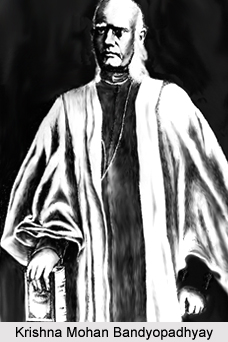 Krishna Mohan Bandyopadhyay (1813-1885) was a prominent member of Young Bengal group of Henry Louis Vivian Derozio. He has also served as a professor of Bishop`s college at Shibpur. He was elected as the member of Royal Asiatic Society.
Krishna Mohan Bandyopadhyay (1813-1885) was a prominent member of Young Bengal group of Henry Louis Vivian Derozio. He has also served as a professor of Bishop`s college at Shibpur. He was elected as the member of Royal Asiatic Society.
Vidyakalpadrum is an educational and semi-educational work whose contents were mostly derived from English and Sanskrit sources. He also wrote The Aryan Witness, Dialogues on the Hindu Philosophy, and Upadeshkatha. He passed away on 11 May 1885.
He converted to Christianity which raised a storm in Hindu society. He also converted his wife, his brother Kali Mohan as well as Ganendra Mohan Tagore, the son of Prasanna Coomar Tagore. He was also a deacon of the Anglican Church in the year 1836 and was superintendent of the Mirzapur School of Christ Church. He preached and delivered sermons in Bengali language. He published the Inquirer in 1831. The Persecuted was published in the same year.
This article is a stub. You can enrich by adding more information to it. Send your Write Up to content@indianetzone.com













